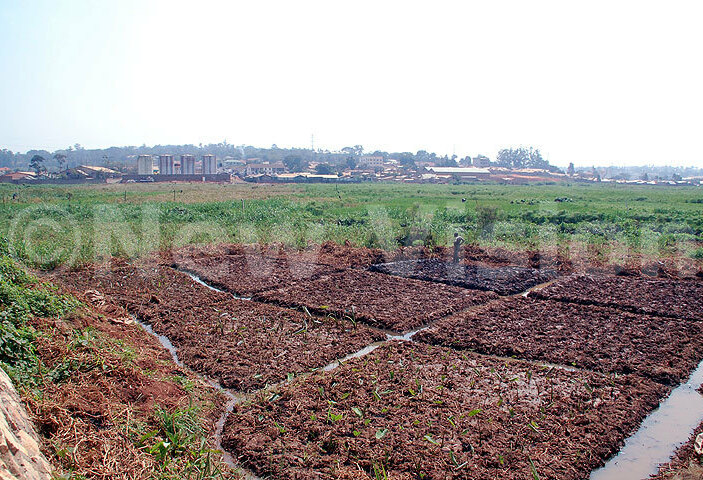Wetlands for our future: sustaining livelihoods
Feb 02, 2016
In Uganda, while the wetland surface area of Uganda was 15.6% (approximately 16%) in 1994, this in 2008 showed a decline.

Sometimes things have to get worse for people to wake up and then begin on a rather difficult process to recover what they have lost. This has been the case for the battered wetlands around lakes Victoria, Kyoga and parts of western Uganda.
After losing about 30% of the wetland cover in two decades, Government authorities have started working with the local communities not only to ensure the protection of the remaining wetlands but also restore the wetlands that have become degraded over the years. This has started paying off in different parts of the country.
"We have not had so much loss in the last one year," Paul Mafabi, the director of Environmental Planning told New Vision in interview. "Even Kampala we have not seen rampant reclamation of the swamps within last year."
He was speaking ahead of the national commemoration of the UN World Wetlands which is observed globally on February 2nd. The theme of this year's World Wetlands Day is "Wetlands for our Future: Sustainable Livelihoods. The national activities to commemorate the day will be organised at Okwang Secondary School, Otuke in north eastern Uganda.
About 64% of wetlands lost globally
According to a report also referred to as the Living Planet released by the World Wide Fund for Nature (WWF), 64% of wetlands worldwide have been lost since 1900, and that 76% of populations of freshwater plants and animals have disappeared in the last 40 years alone.
In Uganda, while the wetland surface area of Uganda was 15.6% (approximately 16%) in 1994, this in 2008 showed a decline down to 10.9% (approximately 11%) indicating a loss of 5%). In terms of wetland coverage as an ecosystem, what has been lost is about 30%.
Biting the hand that feeds you
In parts of western Uganda, the communities have started taking matters in their own hands by slashing some of the crops in the encroached parts of the swamps. The wetlands are providers of water, fish, medicine, raw materials for making handicraft and protect water bodies. Other uses of wetlands include cultural properties where some communities pay homage to their ancestors.
"The wetlands sustain livelihoods," he said, adding that this contributes to the Sustainable Development Goals (SDGs), adding that wetlands also contribute to climate resilience and sinking of carbon, which are part of the SDGs.
Though they are referred to as precious ecological systems, big patches of wetlands sitting around lakes Victoria and Kyoga have been degraded over the years. This is leading to siltation of Uganda's biggest lakes and the River Nile which comes from Lake Victoria and crosses Kyoga on its way to Egypt, according to Mafabi.
He blamed the destruction of the wetlands around Victoria and Kyoga to the increasing population which is accompanied by high urbanization particularly between Masaka and Jinja along the northern shores of Lake Victoria.
He also pointed out that the weak laws have let down the environment. "We are relying on framework laws such as the National Environment Management Act, adding that such laws rely on civil or criminal processes which take a long time.
"We want to establish environmental Courts and charge offenders under a specific law in order to make wetland encroachment very unattractive," said Mafabi.

Demarcation of boundaries
Mafabi said wetland restoration has started with demarcation in different parts of the country. The demarcation of the wetlands in parts of Wakiso, Kampala and Mukono also encountered over 17,000 land titles issued illegally in the wetlands.
He also pointed out that institution of an Environment Police has also helped to reduce encroachment which was getting out of hand before they were put in place.
In addition, the Ministry of Lands has gone slow in relation to illegal allocation of land titles in the wetlands. "They know that the Cabinet has pronounced itself over allocation of land titles in the wetlands," he said, adding that the Ministry of Water and Environment was going to spread its tentacles upcountry. "We want to work with district authorities, the District Land Boards and the banks to discourage encroachment on swamps.
There is light at the end of the tunnel as Government becomes more firm on the sustainable use of the wetlands. The SDGs have also helped to highlight that people have to protect ecological systems such as wetlands in order to secure their future.
Wetlands key for people in a changing climate
Professor Ephraim Kamuntu, the Minister of Water and Environment has that wetlands will help to secure the future of the people by providing different goods and services including protection from floods.
He also attributed the achievements towards wetland restoration and boundary demarcation to the support provided by CARE Uganda and International Union for the Conservation Nature.
He also said the Government has directed against issuance of leases and titles in wetlands. He also said the cancellation process is already is advancing. He also said a programme to restore degraded wetlands is being developed and is expected to commence this year.
"We no longer have the luxury of sitting down and doing nothing as wetlands diminish before our own eyes," he said.
He also pointed out that the wetlands provide services worth an estimated $15 trillion worldwide. "They are the source of our daily water, food, and filter and purify waste and control floods," he stated.
More importantly for our future, wetlands help to fight climate change. Peat lands alone store twice as much carbon, as all the world's forests combined, according to Kamuntu.
"We are mindful that there are new emerging issues and challenges that require our attention if wetland benefits are to be sustained," he said, adding that people and institutions have to work together to secure wetlands for the future.
